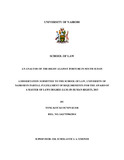| dc.description.abstract | The issue of human rights violations in criminal investigation emerges as one of the much debated subjects amongst academics since the inception of the idea of fundamental human rights all over the world. Human rights remain a center pillar and a pivot around which criminal justice system revolves. It is a dynamic one that constantly generates new defining and regulatory instruments. Human rights today have received an important credence in democracies all over the world. Human rights are also a key to sustainable development, peace and security as embraced globally. One key right recognized in human rights jurisprudence as pivotal in the protection of human rights and to satisfy international human rights standards is the right to freedom from torture.
The ICCPR under Article 10 provides that detained persons should be treated with respect to their dignity. This approach broadens the horizon of protection of human rights in detention places as torture and ill-treatment is prohibited in many human rights instruments such as, UDHR, CAT, ICCPR, and ACHPR which represent the principal foundation of the concept’s development in modern era. Thus, a series of minimum standards for treatment of detained persons are adopted both internationally and regionally which are serving as thresholds to protest violation of human dignity. Therefore, the study, firstly, commences with a thorough analysis and investigation of the violation of the fundamental human rights before and after the country’s independence. It gives a historical background of South Sudan political landscape, legal system and practical human rights violations.
Human rights material, documents and instruments internationally or locally have been identified, analyzed and discussed. Based on the findings of the research, the study argues that generally speaking, there are no adequate control mechanisms out in place to regulate police and security powers in South Sudan compared to other jurisdictions. It further argues that, some other jurisdictions, such as Ethiopia, Kenya and Uganda have some advanced police intervention mechanisms and programmes aimed at improving and constantly checking police and national security work. | en_US |



